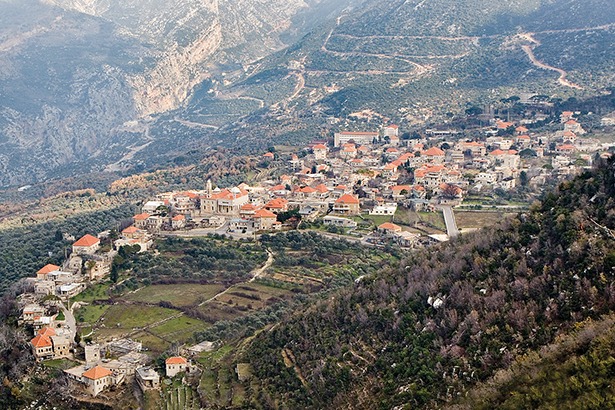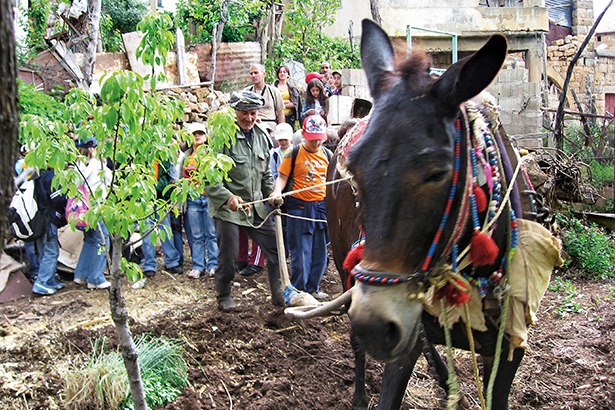The phrase responsible tourism is often used without a second thought, but what do we actually mean by it? Pascal Abdallah of Responsible Mobilities takes time out to explain the concept and map out a responsible destination just for you.
Responsible tourism is an attitude. It calls travelers to a higher standard. It goes far beyond tagging your trip as “Responsible Tourism” or being accommodated at a rural guesthouse. We intend to help reader and travelers distinguish from the various definitions and theories related to responsible tourism and make the right choice.

In every issue of Lebanon Traveler we will explore different concepts, such as ecotourism, volunteerism, etc. and catch up on the latest news about responsible tourism in Lebanon and around the world. We will learn about successful projects that implement or aim to fulfill the Millennium Development Goals (MDGs) – eight international goals that all UN member states have pledged to achieve by 2015. And, you will also have the chance to use the Responsible Destinations list, developed by the Responsible Mobilities Tour Operator, to discover positive places of beauty and culture around the country. As a starting point, in this Fall 2012 issue let us review the evolution of responsible tourism.
Responsible tourism principles
Ecotourism
After about 30 years of wildlife tourism, operators were concerned that their visits might be actively contributing to its decline through negative environmental impact. They began to advocate the idea of “leaving no trace”. This became better known as ecotourism.
Problems With Ecotourism
Over the next decade, the increased number of tourists began to take its toll. Local communities living alongside the wildlife population were angered by the incursions. They felt that if they were to set aside some of the best areas in their local area for (often) overseas visitors, then they too should benefit.
These local communities face the ‘opportunity cost’ of not, for example, using these areas themselves or chopping down trees and taking firewood if an area is to be conserved for wildlife. The population cannot afford to do this without some form of compensation from tourism.
As the years went by ecotourism became an increasingly popular form of marketing and sadly abused by green washers, who exploited its marketing potential without addressing any of the conservation or community issues. In short, there was insufficient focus on the impacts of tourism.
Responsible tourism at a glance
- Involves local people in decisions that affect their lives
- Makes positive contribution to the conversation of natural and cultural heritage
- Generates greater economic benefits for local people
- Provides more enjoyable experiences for tourists
- Responsible travel and tourism
Responsible Travel and Tourism
Responsible travel and tourism acknowledges two important factors. First, the impact of tourism is cultural and economic, as well as environmental. Second, tourists and the tourism industry must take responsibility for their impact. Initially the definition of responsible tourism tended to focus on maximizing the positive social, economic and environmental impacts and minimizing the negative ones. A better example comes from the Cape Town Declaration, which described responsible tourism as ‘creating better places to live in and to visit.’ Note how the benefits to local people are central to this idea.
Responsible Destinations
One way to discover Lebanon is to adopt a responsible tourism attitude and follow a few guidelines that minimize our impact on the environment. We suggest a 2-day excursion in the Batroun region with trips to the Assia, Bshaale, Douma, and Tannourine villages.
Travel to Assia from Batroun, via the Bejdarfel road. Start your visit by discovering the pottery makers at Assia and learn how they produce traditional kitchen wear. Proceed to Bshaale and visit its famous 12 old olive trees, which according to some are millenary trees. Continue towards St Estephane church from where you can walk (90 minutes) to Douma.
Before reaching Douma, you cross by the Monastery of St James (Roman remains in the monastery’s structure) and the nearby Saint Jacques Farm (where they produce the only Lebanese “foie gras” in the Arab world), where you can have lunch.
Continue to Douma, (the mountain’s main trading hub in the 19th century) where you can visit the Old Souk and try the local “raha loukoum” or ice cream, and among the attractions here is the historic Greek Orthodox Monastery of St John, richly decorated with murals of Byzantine style art.
Here you can have the choice of finishing your day by staying in Douma at Grand Hotel Douma or the Maatouq Guesthouse, or continuing to Tannourine where to can spend the night at the Sarkis Guesthouse. On day two, we suggest you go for a walk and discover the Tannourine Cedar Forest Nature Reserve to learn about its rich history. On your way back to Beirut, take the Hadath el-Jebbe Chekka road.
Local guides in the region
Hayat Chalhoub in Douma (+961 3 349 036)
Georges Sarkis Harb in Tannourine (+961 3 679 055)
Or full package tour from Responsible Mobilities (+961 3 218 048)
Responsible Attitude
Get active now!
- Always use a local person living in the area, to whom you pay a fee, to show you around. It’s better if you ask for the trained local guide, this way you can guarantee good service.
- Always try to opt for local guesthouses in order to minimize economic leakage. This means keeping the money you pay in the region instead of paying hotel chains, who do not invest back in the community or the local environment.
- Try to car pool in order to minimize CO2 emissions. You can ask Responsible Mobilities for their Clean Mobility tours, during which public transportation is used.
- Always buy items from the local craftsmen you visit in the villages, otherwise compensate the time they spend with you by donating a small amount of money. This will help keep these traditions alive.
- Try to buy local goods in order to encourage the local economy.
- Do not liter and don’t pick any flowers or shrubs.
- Do walk on trails to avoid harming local plant life.
Article edited on November 10, 2021
Loading

